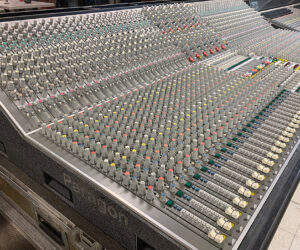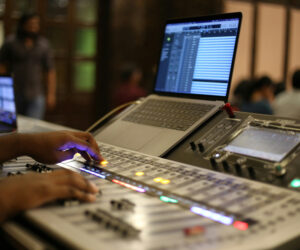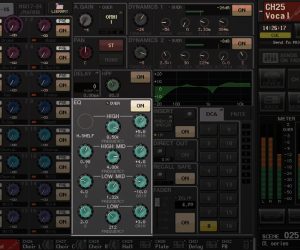“What is the best audio-related or professional advice you’ve received in your career? What is one tip you would give to those starting out in pro audio?” These two questions were posed to our panel of veteran audio professionals for this Roundtable article, and as you’ll see, they’ve responded with a wealth of invaluable information, some of it even reaching beyond the audio realm.
Pat Brown: I’ll go with one from the Cold War era: “trust but verify.” We rely on manufacturer specifications to select and deploy audio products. Some of these specifications are perceived as quality benchmarks and can therefore directly influence the sale of the product. This makes them suspect with regard to what the manufacturers do and don’t tell you.
Power ratings for amplifiers and loudspeakers are the most notable example. The marketplace has conditioned us to expect and accept idealized performance claims that few products actually meet, such as the “10 kW+” power amps coming into the market, and the “10 kW+” loudspeakers they connect to. When asked by an amplifier engineer about a meaningful test waveform for a power amplifier, I replied “A sine wave.” He replied, “For how long?” Thirty years ago the answer would have been “indefinitely.” Today, some specs have it down to 1 cycle!
Another example is audio bandwidth. A 48 kHz sample rate (with a resultant audio bandwidth of just under 24 kHz) is considered by some to be insufficient for their golden ears. Double it to 96 kHz and “the veil comes off” and everything is cleaner and brighter. Nonsense, but it turns the octave above 24 kHz into a market, and people get in line with their money (or someone else’s) to drink the Kool-Aid.
As audio professionals we owe it to ourselves and our customers to understand the practical limitations for audio products of all types. This understanding is developed by measuring everything you can get your hands on, both electrically and acoustically. So long as there are those who trust without verifying, there will be a big market for hyped-up product specifications, accompanied by unrealistic expectations on the part of audio people and their customers.
Chris Salamone: The best advice I received comes from an interview of one of my heroes, Bob Clearmountain. I can’t remember his exact wording so I will give you my spin on what he said: The lead vocal is always king. Leave it on while you’re building your mix. This way, you’re forced to make room for it.
To those just starting out, I think the following applies in all aspects of life: If you have a passion for something, anything is possible. Curiosity coupled with a great work ethic will take you a long way. I would do 8-hour sessions with clients in the studio and stay an additional 8 unpaid hours on my own, experimenting with audio. Sometimes I would not go home for days, sleep on the couch for a few hours, wake up and do it all over again. This went on for years, and still does.
Karl Winkler: One of my first audio jobs out of school was as a technician for a pro audio dealership in Burbank, CA. There was a head tech and I was the assistant, at least for a few days until the boss quit, and then I was the head tech… I had some book knowledge and a little bit of practical tech, but needed to learn a lot. It was a frustrating job, and I wasn’t terribly happy there. I called one of my favorite teachers and told him about my challenges, and his response sticks with me: “Every situation is a learning opportunity. The key is to figure out what you are supposed to learn.” That advice has proven quite valuable in my career since.
To those coming up is this: You may know quite a bit already, but you really don’t know until you’ve paid your dues in a wide variety of challenging situations. Take the initiative, put the work in, keep your ego in check, and look for learning opportunities at every turn. At the same time, take some of the advice you hear from the old guard with a grain of salt. There is a lot of misinformation passed around as gospel, and you will need to learn for yourself how to separate the good quality info from the questionable.
Mike Sokol: I started working as a one-off sound tech for MHA Audio some 30 years ago. This sound company is owned and run by Mike Scarfe, a legend in live sound around the world, and he was also the road engineer and A1 for acts like AC/DC, B52s, Paul McCartney, Prince and hundreds of others, plus every kind of political gig you can imagine.
Check Out More Roundtable Articles On PSW:
— Name That Tune: A Cornucopia Of System Test Track Selections
— Bang On The Drum All Day: Tips For Optimizing The Kit In The Mix
— All Wrapped Up: A Treasure Trove Of Advice About Cable & Interconnect
Mike would always get the high-end gigs because he was meticulous with the details. He told me many times “they pay me to be anal” so we would spend extra time at every gig making sure there were no hums in the system, the loudspeakers were lined up perfectly, the cables were carefully run and gaffed. We “pinked out” every room and walked it for even coverage – even the small ones.
He had a packing chart for the truck with every case numbered so it would be packed the same way. I use the same mindset for any of my solo gigs, going in every time with 100 percent of my best microphones, amplifiers, loudspeakers and attitude, even if it’s just a Bingo gig. It also means that I can charge more and still get the best gigs.















